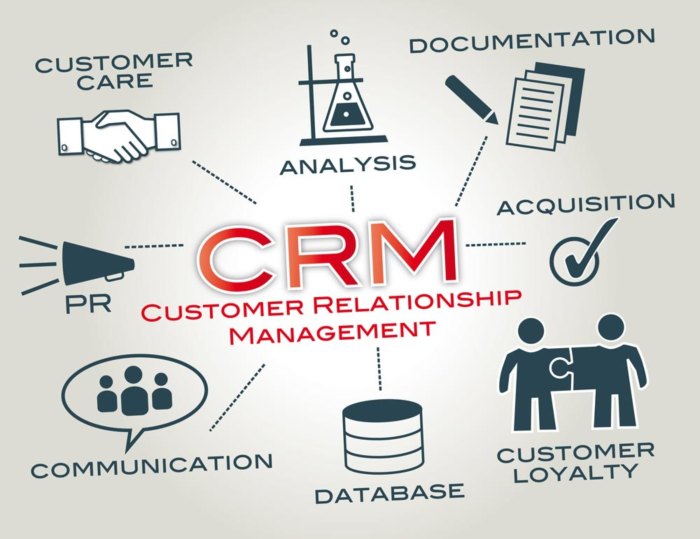Implementing CRM for small businesses is crucial in today’s competitive market. From enhancing customer relationships to optimizing sales processes, CRM can revolutionize how small businesses operate. Let’s dive into the key aspects of implementing CRM for small businesses.
Exploring the benefits, choosing the right system, and effective implementation strategies are all vital components in ensuring the success of CRM integration for small businesses.
Importance of CRM for small businesses
Implementing a Customer Relationship Management (CRM) system can greatly benefit small businesses in various ways. From improving customer relationships to streamlining sales and marketing processes, CRM plays a crucial role in helping small businesses thrive in today’s competitive market.
Improved Customer Relationships and Retention
CRM allows small businesses to track customer interactions, preferences, and purchase history. By having all this information in one place, businesses can personalize their communication with customers, leading to stronger relationships and improved customer retention. For example, sending personalized emails or offers based on a customer’s previous purchases can help businesses keep customers engaged and loyal.
Streamlining Sales and Marketing Processes, Implementing CRM for small businesses
CRM systems help small businesses automate and streamline their sales and marketing processes. By tracking leads, managing contacts, and analyzing customer data, businesses can identify potential sales opportunities and target the right audience with their marketing campaigns. For instance, CRM software can automate follow-up emails, track sales pipelines, and provide insights on customer behavior, enabling businesses to make data-driven decisions and optimize their sales and marketing strategies.
Check CRM software comparison analysis to inspect complete evaluations and testimonials from users.
Choosing the right CRM system for small businesses

In today’s competitive business environment, selecting the right Customer Relationship Management (CRM) system is crucial for small businesses to thrive. With numerous options available in the market, it can be overwhelming to decide which CRM software best fits the needs of a small business. Here, we will compare different CRM software options suitable for small businesses, discuss key features to look for when selecting a CRM system, and share tips on evaluating scalability and customization options.
Comparison of CRM software options for small businesses
When choosing a CRM system for a small business, it’s essential to consider the specific needs and budget constraints. Here are some popular CRM software options suitable for small businesses:
- HubSpot CRM: Known for its user-friendly interface and robust features, HubSpot CRM offers a free version that includes basic CRM functionalities.
- Zoho CRM: Zoho CRM is a cost-effective option with a wide range of features, including sales automation, analytics, and marketing tools.
- Salesforce Essentials: Salesforce Essentials is designed specifically for small businesses, providing essential CRM tools to manage customer relationships effectively.
Key features to look for in a CRM system
When evaluating CRM systems for small businesses, it’s crucial to look for key features that can streamline processes and enhance customer interactions. Some essential features to consider include:
- Customization options: Ensure the CRM system can be tailored to meet the specific needs of the business and industry.
- Scalability: Choose a CRM system that can grow with the business and accommodate increasing data and users.
- Integration capabilities: Look for CRM software that seamlessly integrates with other tools and platforms used by the business.
- Mobile accessibility: Opt for a CRM system that offers mobile apps or responsive design for on-the-go access.
Tips for evaluating scalability and customization options
To ensure the selected CRM system is scalable and customizable for a small business, consider the following tips:
- Request demos and trials: Test the CRM software to see how well it aligns with the business requirements and if it can scale as the business grows.
- Consult with vendors: Reach out to CRM vendors to discuss customization options and scalability features available.
- Seek feedback: Gather insights from current users of the CRM software to understand its scalability and customization capabilities.
Implementing CRM effectively for small businesses: Implementing CRM For Small Businesses

Implementing a CRM system effectively is crucial for small businesses to optimize their customer relationships and improve overall efficiency. By following the right steps, training employees adequately, and measuring success and ROI, small businesses can ensure a successful CRM implementation.
Steps involved in implementing a CRM system for a small business
- Define your objectives and goals for implementing CRM.
- Choose the right CRM system that aligns with your business needs.
- Customize the CRM system to fit your specific requirements.
- Integrate the CRM system with existing business processes and tools.
- Train employees on how to effectively use the CRM system.
- Collect and input relevant data into the CRM system.
- Monitor and evaluate the performance of the CRM system regularly.
Best practices for training employees on using the CRM system
- Provide comprehensive training sessions for all employees involved.
- Offer hands-on practice and simulations to ensure understanding.
- Create user guides and resources for reference and troubleshooting.
- Assign a dedicated CRM champion to provide ongoing support and guidance.
- Incorporate feedback from employees to continuously improve training methods.
Ways to measure the success and ROI of implementing CRM for small businesses
- Track customer satisfaction and retention rates before and after CRM implementation.
- Monitor sales growth and conversion rates to evaluate the impact of CRM on revenue.
- Analyze productivity and efficiency improvements in customer interactions and workflows.
- Calculate the cost savings and time efficiencies achieved through CRM implementation.
- Conduct surveys and feedback sessions with employees to gauge their satisfaction and perceived impact of CRM.